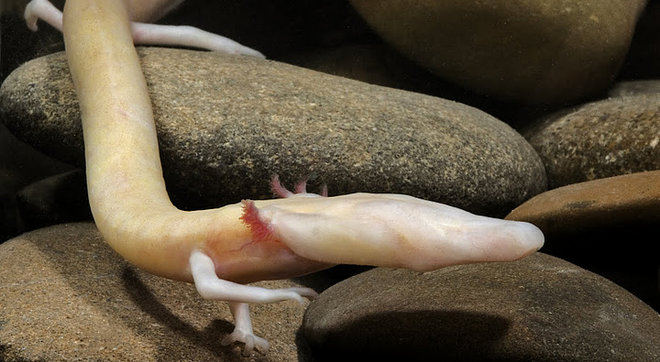Environmental groups call on the EBRD not to finance “high risk” underground hydropower plant in Croatian cave
Croatian and international environmental organisations (more than 30 of them) have today (26. October 2011.) called on the European Bank for Reconstruction and Development not to go ahead with a planned EUR 123 million loan for the Ombla hydropower plant near Dubrovnik in Croatia, due to be approved by the bank's Board of Directors on 8th November
In an open letter to the bank, the organisations point to ecological, economic, and procedural problems with the plans, which even the consultants hired by the EBRD to assess the project have described as “high risk” [1].
“The hydropower plant planned by the Croatian electricity company HEP would involve flooding a cave with high biodiversity value [2] that is due to be protected as part of the Natura 2000 biodiversity network when Croatia enters the European Union. Several important studies are still missing and the Environmental Impact Study is more than 10 years old. It's an obvious example of rushing to finish destructive projects quickly before Croatia can be held accountable under EU environmental legislation,” said Jana Bedek of the Croatian Biospeleogical Society. “It is shocking that a public bank like the EBRD is considering financing this kind of foul play,” she added.
“However bats and salamanders are not the only ones in danger here. The plant would be built in karst rock formations that are like a Swiss cheese. No-one fully understands what is connected to what, and trying to plug these carries a high risk of failure and unintended effects on connected water systems” added karst expert Dr. Ivo Lucic.
Adding to concerns about the project's environmental impacts, the EBRD's consultants Tractabel Engineering and Projektni Biro Split have concluded that “the project fails to recover both investment outlays and recurrent costs, in fact yielding a considerable cost in commercial terms …. the project could only be implemented if it was heavily subsidized by the government”. Their report goes on to add that increasing electricity prices by 200 percent could also solve the problem [3], a move not likely to be welcomed by the Croatian public.
“It is hard to find anything to say in favour of the Ombla project”, concludes Jagoda Munic of Friends of the Earth Croatia. “Considering the high environmental risks, we believe it is unjustified to cause significant disturbance to a proposed Natura 2000 habitat for a project that may never go further than the first stage, in which no electricity would be produced. We therefore ask the EBRD to withdraw from the project.”
Contacts:
Jana Bedek, Croatian Biospeleological Society, +385 (0)91 5761 172
Dr. Ivo Lučić, karst expert, +385 (0)98 347 669
Jagoda Munić, Zelena akcija/Friends of the Earth Croatia: +385 (0)98 1795 690.
----
The signatories of the letter are:
Zelena akcija/FoE Croatia, Croatia
Croatian Biospeleological Society, Croatia
Udruga Grad, Dubrovnik, Croatia
CEE Bankwatch Network
Friends of the Earth Europe
WWF MedPO
European Environmental Bureau
South East Europe Network on Energy and Transport - SEENET
Transparency International Hrvatska, Croatia
Zelena Istra, Pula, Croatia
Srđ je naš, Dubrovnik, Croatia
Eko Centar Zeleno Sunce, Dubrovnik, Croatia
Speleološka udruga Vjetrenica Popovo polje, Ravno, BiH
Biospeleological Society in Bosnia and Herzegovina
Center for Environment, BiH
Association for Animal Inventarisation and Conservation, Ilijaš, BIH
NGO Green Way, BIH
Brodsko ekološko društvo-BED, Slavonski Brod, Croatia
Eko Zadar, Zadar, Croatia
Sunce, Split, Croatia
NGO Baobab, Croatia
Speleološko društvo "Mijatovi Dvori " –Tomislavgrad, BIH
Udruga Naša Baština –Tomislavgrad, BIH
Centar za Održivi Razvoj "Una", Martin Brod – Bihać, BIH
Prijatelji prirode / Friends of nature EKO ELEMENT
Centar za ekologiju i energiju, Tuzla, BIH
Association „Ekotim“, Sarajevo
NGO „Močvara“, Čapljina, BIH
NGO „Zeleni Neretva“ iz Konjica, BIH
U.G. "Sadnice Mira - Peace Trees" Zavidovići
Naturskyddsföreningen - Swedish Society for Nature Conservation
Asociación para la Justicia Ambiental, AJA Spain
Instituto Internacional de Derecho y Medio Ambiente(IIDMA), Spain
Ecologistas en Accion, Spain
-----------------------------
[1] “Undertaking the project in full, as designed at present, carries a high risk of the project not achieving its objectives”. Tractabel Engineering; Projektni Biro Split: Ombla Hydropower Project – European Bank for Reconstruction and Development – Technical Due Diligence – Final Report Rev. C September 2011, p.9-10
[2] There are five species of protected bats and Proteus anguinus, the cave salamander (IUCN Red List (VU); FFH Directive: Annex II, IV; Bern Convention: Annex II), Troglocaris anophthalmus, the cave shrimp (IUCN Red List (VU)) and Congeria kusceri, the cave clam (FFH Directive: Annex II, IV). Among other cave species four taxa are found only in the cave Vilina špilja – Ombla izvor, and nowhere else in the world: Horatia knorri, Lanzaia kusceri, Plagigeria nitida angelovi (all three are aquatic cave snails) and Eukonenia pretneri, the cave palpigrade. Proof that the cave is far from being fully explored came in 2009 with the discovery of a new Genus of terrestrial isopod in the cave.
[3] Tractabel Engineering; Projektni Biro Split: Ombla Hydropower Project – European Bank for Reconstruction and Development – Technical Due Diligence – Final Report Rev. C September 2011, p.122-123.
